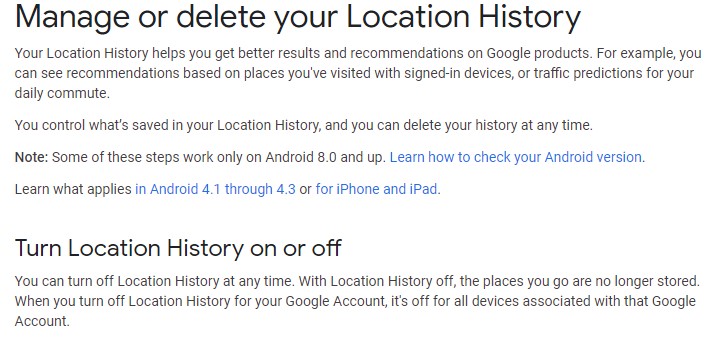Google is probably the most powerful and most omnipresent toy in our lives, and it’s also the bridge to big business that wants to know where we are and what we’re interested in every second of our connected lives.
Keeping your location history on, according to Google, helps you get better results and recommendations in a search. In other words, it helps retailers make sure you’re getting inundated with localized advice on what to buy.
But if you thought you had control over your Location History on your devices—think again.
You can turn it off, but that’s just an illusory form of peace of mind.

(Click to enlarge)
According to the Associated Press, Google records user locations even when they’ve turned it off.
The AP study, verified by researchers at Princeton University, found that Google can see your location even with the option is disabled, and it continues to track you, regardless.
"You would think that telling Google that you didn't want your location to be tracked by disabling an option called ‘Location History’ would stop the internet giant from storing data about your location. It seems pretty sneaky to me that Google continues to store location data, unless you both disable ‘Location history’ and ‘Web & App Activity’, writes security researcher Graham Cluley on his blog. Related: Standards Go Out The Window As Employers Struggle To Fill Jobs
According to AP, the Princeton researchers created a visual map showing the movements of colleague Gunes Acar who was using an Android phone with the location history turned off. The map showed his train commute around New York as well as visits to The High Line park, Chelsea Market, Hell's Kitchen, Central Park and Harlem. It also revealed his home address.
The study also found that Google takes a “snapshot” of your location when you open its Google Maps app, even if you have location tracking turned off.
For now, all Google has said in response is this:
“There are a number of different ways that Google may use location to improve people’s experience, including: Location History, Web and App Activity, and through device-level Location Services. We provide clear descriptions of these tools, and robust controls so people can turn them on or off, and delete their histories at any time.”
But the tech giant may find that it needs to respond more fully.
The AP study hasn’t gone unnoticed. It’s prompted a tough reaction from Senator Mark Warner, a Virginia Democrat who also happens to be vice chairman of the Senate Intelligence Committee.
Senator Warner accused technology companies of having "corporate practices that diverge wildly from the totally reasonable expectation of their users".
He’s calling for policies that give users more control over their data, and he’s also calling for stiff penalties for anyone who violates user trust and expectations.
Related: China's Most Powerful Weapon In The Trade War
And Senator Warner isn’t alone. Representative Frank Pallone of New Jersey chimed in as well, saying "Congress needs to take action to protect consumers". He’s calling for public hearings.
Users and governments alike are—belatedly—becoming concerned about the ominously unchecked power amassed by tech giants like Google.
"Google makes the internet work. The internet would not be accessible to us without a search engine. They control access to it. That's the important part. Google is the gatekeeper for … the World Wide Web...," Gary Reback, one of the most prominent antitrust lawyers in the country, told reporters a few months back.
Jeremy Stoppelman, CEO of Yelp, sums it up like this: "Google wields enormous power across the industry. And they set the rules. The question is who's watching Google?”
By Damir Kaletovic for Safehaven.com
More Top Reads From Safehaven.com
















